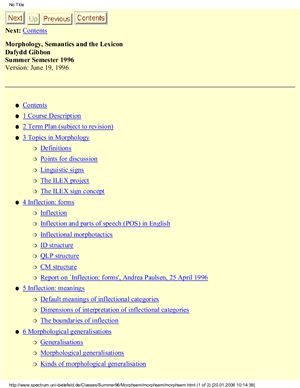Курс лекций, Universit?t Bielefeld, 1996, -75 pp.
This seminar will cover an area of English which has recently come to be called `morphosemantics' (by analogy with notions such as `morphotactics' and `morphophonology'. We will be referring to a number of recent studies in morphology and examining their contribution to the study of the semantics of composite (derived or compound) words.
Emphasis will be placed on the development of coherent semantic descriptions of words in context, based on the study of short texts, and on the development of a semantic database of a small but extendable fragment of English which will serve as the basis of a semantic lexicon. A collection of advanced experimental materials on morphology and lexicology, with interactive
WWW access, is provided in the HyprLex environment.
A bibliography is included below. Participants are recommended to prepare a bibliography on their own initiative for this course, and do some detective work in tracking down articles and books by Lyons, Pustejovsky and Boguraev, Spencer, Carstairs-McCarthy, Lieber, Gazdar and Evans, and Anderson. Further material will be provided at the beginning of term. World Wide Web search engines should be used to extend your own collection of materials. For revision, see for instance, my Introduction to Linguistics.
All participants are expected to participate actively in preparing reports for discussion in class, and in the practical descriptive work. Qualifications may be obtained by means of a written term paper.
Course Description
Term Plan (subject to revision)
Topics in Morphology
Inflection: forms
Inflection: meanings
Morphological generalisations
Compounding: forms
Compounding: meanings
Derivation: forms
Derivation: meanings
Paradigm morphology
Project: formulation and test
Project: discussion of results
This seminar will cover an area of English which has recently come to be called `morphosemantics' (by analogy with notions such as `morphotactics' and `morphophonology'. We will be referring to a number of recent studies in morphology and examining their contribution to the study of the semantics of composite (derived or compound) words.
Emphasis will be placed on the development of coherent semantic descriptions of words in context, based on the study of short texts, and on the development of a semantic database of a small but extendable fragment of English which will serve as the basis of a semantic lexicon. A collection of advanced experimental materials on morphology and lexicology, with interactive
WWW access, is provided in the HyprLex environment.
A bibliography is included below. Participants are recommended to prepare a bibliography on their own initiative for this course, and do some detective work in tracking down articles and books by Lyons, Pustejovsky and Boguraev, Spencer, Carstairs-McCarthy, Lieber, Gazdar and Evans, and Anderson. Further material will be provided at the beginning of term. World Wide Web search engines should be used to extend your own collection of materials. For revision, see for instance, my Introduction to Linguistics.
All participants are expected to participate actively in preparing reports for discussion in class, and in the practical descriptive work. Qualifications may be obtained by means of a written term paper.
Course Description
Term Plan (subject to revision)
Topics in Morphology
Inflection: forms
Inflection: meanings
Morphological generalisations
Compounding: forms
Compounding: meanings
Derivation: forms
Derivation: meanings
Paradigm morphology
Project: formulation and test
Project: discussion of results

